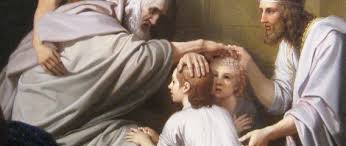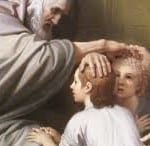Moshe Kempinski
Joseph is told that his father’s health was fading and he decides to bring his two sons to receive his father’s blessing
“And [someone] told Jacob and said, “Behold, your son Joseph is coming to you.” And Israel summoned his strength and sat up on the bed. And Jacob said to Joseph, “Almighty G-d appeared to me in Luz, in the land of Canaan, and He blessed me. And He said to me, ‘Behold, I will make you fruitful and cause you to multiply, and I will make you into a congregation of peoples, and I will give this land to your seed after you for an everlasting inheritance.’ And now, [as for] your two sons, who were born to you in the land of Egypt, until I came to you, to the land of Egypt they are mine. Ephraim and Manasseh shall be mine like Reuben and Simeon.” ( Genesis 48:2-5)
Though Joseph was not his first born ,Jacob was eager to give to him some of the spiritual and physical blessings given to a firstborn;
“Rather, he must acknowledge the firstborn, ….and give him a double share in all that he possesses, because he [this firstborn son] is the first of his strength, then he has the birthright entitlement.”(Deuteronomy 21:17)
Joseph’s children’s inheritance then becomes the fulfilment of a double portion for Joseph ”But your children, if you beget [any] after them, shall be yours; by their brothers’ names they shall be called in their inheritance.(Genesis 48:6)”
Jacob then blesses his grandchildren, yet his words go beyond the “mere” blessing.
“So he blessed them on that day, saying, “With you, Israel will bless, saying, ‘May G-d make you like Ephraim and like Menasheh “( ibid 48:20)
Why “like Ephraim and like Menasheh”? Why not like Abraham or like Isaac? What did Jacob see in his prophetic vision that prompted such a dramatic declaration? As a result these words have impacted prayers and the blessings given over to our children throughout thousands of generation.
Every Friday night my wife and I engage in a ceremony that is both moving and empowering. Before the Shabbat, meal we each approach a child and put our hands on their heads and bless them , one by one .
Though we each add our own thoughts and wishes , we begin our prayers and thoughts with the words taken from the priestly blessing (Numbers 6:24-26) . As we approach a son or a daughter we preface the priestly blessing with a declaration;
For our sons we begin with the words; May you be like Ephraim and Menashe.
For our daughters we declare, May you be like Sarah, Rebecca, Rachel, and Leah.
“Sarah, Rebecca, Rachel, and Leah” is self-explanatory, but we need to understand the subtext of “’May G-d make you like Ephraim and like Menasheh”
Ephraim and Menasheh were the first two children to be born into the exile of Egypt. Joseph gave them names that had meaning for him but would also carry eternal meaning for all the people of Israel.
“Menasheh and Ephraim were born to Joseph before the year of the famine set in, whom Osnat the daughter of Poti -phera, the governor of On, bore to him. And Joseph named the firstborn Menasheh, for “G-d has caused me to forget all my hardships and all my father’s house.” And the second one he named Ephraim, for “G-d has made me fruitful in the land of my affliction.”(ibid 41:50-52)
“Exile” would become a very difficult and soul threatening experience. It would not only be threatening in the physical reality but its insidious tentacles would distort and divert our inner urges and passion away from their original purpose.
The upbringing of Menasheh and Ephraim would offer needed instruction for the coping mechanisms necessary in the midst of exile and it would be in all the difficult phases in our life.
The first lesson would be gleaned from the name of Menasheh ,”G-d has caused me to forget all my toil “. The difficulties and persecutions of our national journey could be so overwhelming that it could deflect or completely stop our movement forward. Assimilation and self hatred can become the results of such a deflection. There are times wherein our past, corporal or individual imprisons us in dungeons of pain and anger. There is no growth in those dark corners of our soul. Those chains need to be broken and put away from our consciousness”.
Therein is the power of” G-d has caused me to forget all my hardships”
Yet on the other hand we must also learn the lesson ensconced in the name of Ephraim,”G-d has made me fruitful in the land of my affliction.” The simple act of gratitude ( hakarat haTov) for what there is all around us is a critical key for moving forward out of “affliction” and into healthy growth. We must learn to be aware and thankful for what good there is around us in order to have the strength to move forward.
Jacob does not bless Menasheh first, even though he was the first born “But Israel stretched out his right hand and placed [it] on Ephraim’s head, although he was the younger, and his left hand [he placed] on Manasseh’s head. He guided his hands deliberately, for Manasseh was the firstborn. “(ibid 48:14)
In the midst of affliction it is difficult to see light. Without the hope that the light is there around us, the dungeons of despair become overwhelming. Jacob placed his hand on Ephraim first as if to say;
“look around you and see the blessings that are there and by so doing you will be able to break forth out of the pains of the past”
The two brothers representing the two ingredients of spiritual growth and happiness seem to be able to do so with the sibling rivalry that had afflicted their family for generations.
As a people and as individuals need to recognize the glorious opportunities that abound around us and at the same time we need to break out of the pains and persecutions of the past. In this manner we as a people and each one of us individually will achieve our purpose and goals.
May we all be like Menasheh and Ephrayim.
LeRefuat Yehudit bat Golda Yocheved

